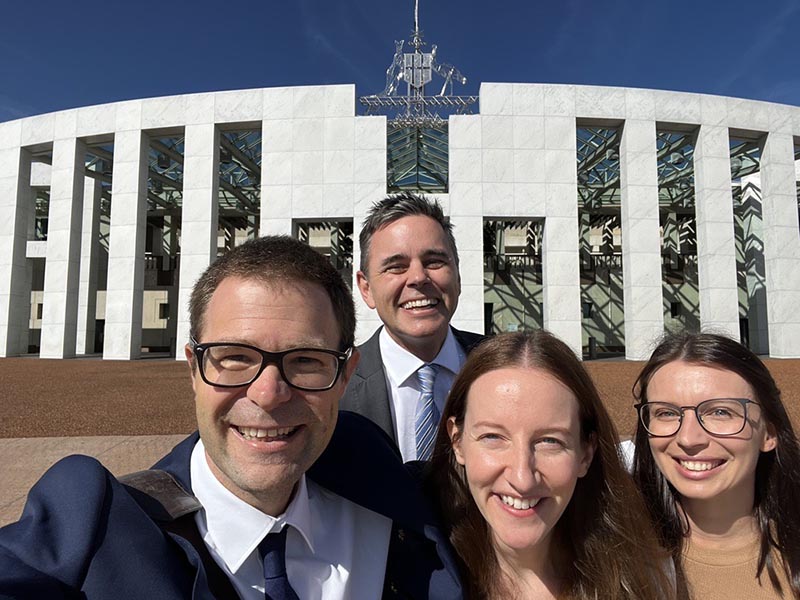Search
Research
Maternal immune-related conditions during pregnancy may be a risk factor for neuropsychiatric problems in offspring throughout childhood and adolescenceEmerging research suggests that maternal immune activation (MIA) may be associated with an increased risk of adverse neurodevelopmental and mental health outcomes in offspring. Using data from the Raine Study, we investigated whether MIA during pregnancy was associated with increased behavioral and emotional problems in offspring longitudinally across development.
Research
Get it right, make it easy, see it all: Viewpoints of autistic individuals and parents of autistic individuals about the autism diagnostic process in AustraliaThe clinical process for being evaluated for an autism diagnosis is often time consuming and stressful for individuals and their caregivers. While experience of and satisfaction with the diagnostic process has been reviewed in the literature, few studies have directly investigated the viewpoints of individuals diagnosed with autism and caregivers of autistic individuals about what is important in the autism diagnostic process.
Research
Targeting intolerance of uncertainty in young children diagnosed with autism: A randomized controlled trial of a parent-mediated group interventionYoung children diagnosed with autism experience high rates of co-occurring anxiety, with uncertainty-related concerns commonly reported. This randomized controlled trial investigated an 8-week parent-mediated group anxiety intervention, “Coping with Uncertainty in Everyday Situations” (CUES-Junior©).
Research
“The Wrong Supports Are Worse than no Support”: Autistic Perspectives on Early-in-Life Infant Autism SupportsEvidence suggests that the earlier supports are provided to young Autistic children, the better the overall outcomes. Supports have typically only been available after an autism diagnosis but with increased knowledge about early developmental trajectories, clinical supports can now be offered prediagnosis for infants showing early autism features and/or those with a family history of autism.
Research
The perspectives of autistic adolescents and their parents on sleep strategies for insomniaAutistic adolescents are vulnerable to sleep difficulties, with up to 80 % experiencing sleep problems, most commonly insomnia. Little is known about how autistic adolescents are involved in their own sleep treatment, and their depth of knowledge about their sleep difficulties. The aims of this study were to investigate autistic adolescent and parent perspectives of experiencing and managing insomnia, and what factors influence the development of these perspectives on insomnia and treatment.
Research
A pilot randomised controlled trial of a telehealth-delivered brief ‘Sleeping Sound Autism’ intervention for autistic childrenAccess to behavioural sleep intervention is beneficial for autistic children, yet many families face barriers to access associated with location and time. Preliminary evidence supports telehealth-delivered sleep intervention. However, no studies have evaluated brief telehealth sleep intervention.
Research
Which emerging autism features at 12 months of age are associated with later parent-child interaction?Parent-child interactions (PCI) in infants with an elevated likelihood (EL) of autism start to diverge from other infants toward the end of the first year. This divergence is often attributed to emerging features of autism impacting infant social interactions in ways that become increasingly amplified. The aim was to identify which, if any, 12-month autism features were associated with later PCI qualities.

Australia’s first national guideline for supporting the learning, participation and wellbeing of autistic children and their families.
Research
A Parent-Mediated Intervention for Newborns at Familial Likelihood of Autism: Initial Feasibility Study in the General PopulationDevelopmental theory and previous studies support the potential value of prodromal interventions for infants at elevated likelihood of developing autism. Past research has supported the efficacy of parent-mediated prodromal therapies with infants from as early as 7 months. We outline the rationale for implementing interventions following this model from even earlier in development and report on the feasibility of a novel intervention developed following this model of parent-mediated infant interventions.
Research
Non-pharmacological interventions for autistic children: An umbrella reviewThe breadth of available non-pharmacological interventions for autistic children, with varying evidence for efficacy summarised in multiple systematic reviews, creates challenges for parents, practitioners, and policymakers in navigating the research evidence. In this article, we report the findings of an umbrella review of 58 systematic reviews of non-pharmacological interventions for autistic children (aged 0–12 years).
